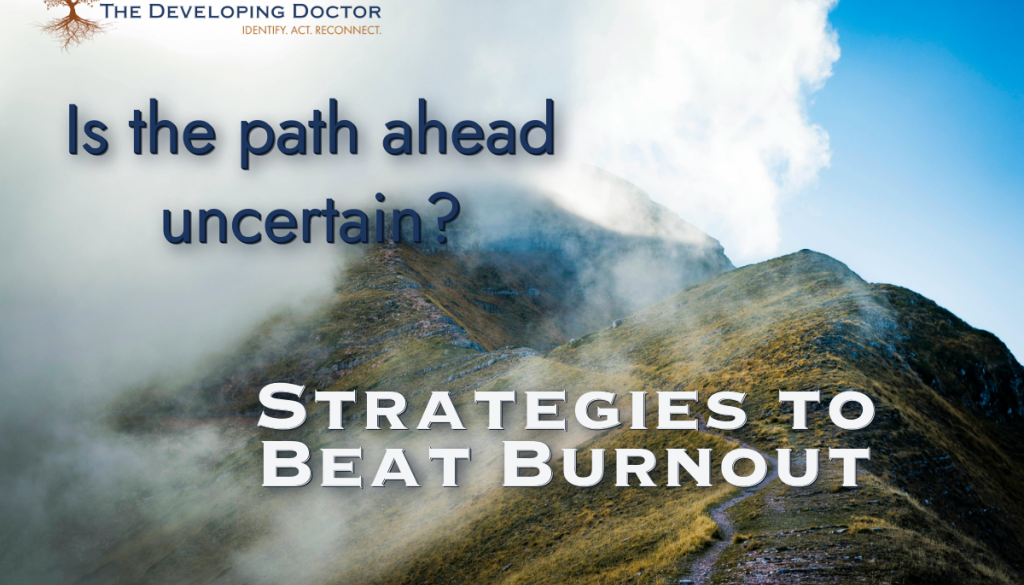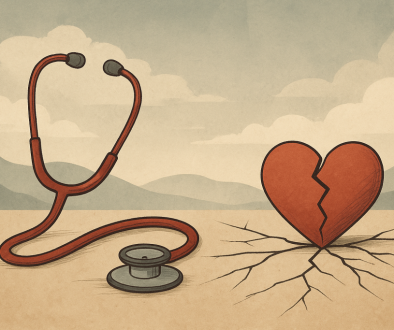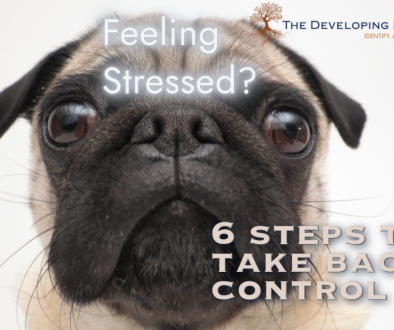Physician Burnout Is Not a Failure—It’s a Fork in the Road
It happens in the quiet moments between patients.
That subtle yet persistent voice asking, “Is this all there is?” You catch yourself staring blankly at your EHR screen, wondering how you morphed from the idealistic medical student you once were to the exhausted physician you’ve become. Secure chat alerts for the fifth time that hour, and you feel that familiar tightness in your chest, not anxiety exactly, but a profound weariness that seems to have settled into your bones.
If this resonates with you, I want you to know something important:
You are not alone, and this is not your failure.
As a physician coach who’s worked with hundreds of doctors navigating these challenging waters, I’ve seen how physician burnout transforms brilliant, compassionate healers into shells of their former selves. But I’ve also witnessed remarkable transformations when these same physicians recognize burnout not as an endpoint but as a critical junction, a fork in the road of their professional journey.
Understanding the True Nature of Physician Burnout
Burnout isn’t simply being tired or having a bad week. It’s a chronic condition characterized by emotional exhaustion, depersonalization (treating patients as objects rather than people), and a diminished sense of personal accomplishment. The latest research shows that over 50% of physicians experience at least one symptom of burnout, with rates continuing to climb since the pandemic.
A cardiologist I worked with, let’s call her Dr. Sarah, described it as “practicing underwater”—everything took more effort, seemed muffled, and left her gasping for air. “I used to think burnout meant weakness,” she told me. “Now I understand it’s my mind and body telling me something critical about my environment and choices.”
This reframing is essential. Physician burnout isn’t evidence of personal deficiency—it’s often a rational response to a broken system. Many doctors are working within healthcare environments that prioritize metrics over meaning and volume over value. When we understand burnout as a systemic issue rather than a personal failing, we open the door to more effective solutions.
The Warning Signs You Shouldn’t Ignore
Before we discuss pathways forward, it’s crucial to recognize burnout’s early signals, which often whisper before they scream:
Physical symptoms frequently appear first—insomnia, frequent illnesses, headaches, or digestive issues that seem to worsen with work stress. Emotional indicators follow: irritability with colleagues or loved ones, emotional numbness with patients, or a sense of dread about going to work.
Cognitive changes often fly under the radar but are equally important: difficulty concentrating, making more medical errors, forgetting details, or feeling mentally foggy. And perhaps most telling are the existential symptoms: questioning your career choice, feeling trapped, or losing the sense of purpose that led you to medicine.
An emergency physician I coached, Dr. James, initially dismissed his symptoms. “I thought I was just going through a phase,” he shared. “Then I found myself hoping patients wouldn’t come in during my shift—that’s when I knew something was fundamentally wrong. The physician I wanted to be would never think that way.”
Why Traditional Solutions Fall Short
(how to prevent physician burnout)
The conventional wisdom around burnout prevention—resilience training, mindfulness, better “self-care”—can be valuable tools but often miss the larger picture. These approaches sometimes inadvertently place the burden of adaptation solely on the physician rather than addressing the systemic factors driving burnout.
As one frustrated hospitalist told me, “I don’t need another lecture on meditation or time management. I need fewer patients per shift, functional EMR systems, and administrators who understand what patient care actually requires.”
She’s right. While individual practices can help mitigate burnout’s effects, sustainable solutions must include systemic changes. However, waiting for healthcare systems to transform isn’t always practical for the physician suffering now. This is where understanding your options becomes crucial.
The Four Pathways Forward When Facing Burnout
When physicians reach this fork in the road, I typically see four potential paths—each valid depending on your unique circumstances, values, and aspirations:
1. Recalibration Within Your Current Role
For some physicians, burnout signals not that they’ve chosen the wrong profession but that adjustments are needed within their current practice. This might involve renegotiating your contract, reducing clinical hours, eliminating particular responsibilities that drain you, or establishing firmer boundaries around your time.
A family physician I worked with discovered that removing the burden of practice administration while maintaining patient care responsibilities rekindled her passion. “I realized I didn’t hate medicine,” she said. “I hated spending 60% of my time on tasks I wasn’t trained for and didn’t enjoy.”
Recalibration often requires having difficult conversations with partners or administrators—conversations that benefit from preparation and strategy. Many physicians find that clarity about their non-negotiables, coupled with data about their value to the practice, creates leverage for meaningful change.
2. Transition to a Different Clinical Setting
Sometimes burnout stems not from clinical medicine itself but from your particular practice environment. Exploring different practice models—concierge medicine, direct primary care, locum tenens, academic medicine, or hospital employment—can significantly alter your day-to-day experience without requiring you to leave patient care entirely.
Dr. Thomas, an internist who felt crushed by the pace of his high-volume practice, found renewal in a direct primary care model. “I see fewer patients, but I actually know them now,” he shared. “My income decreased, but my sense of purpose and **work-life balance as a physician** improved dramatically. I can breathe again.”
These transitions require careful financial planning and honest assessment of what aspects of your current situation contribute most to your burnout, but they can offer a revitalizing middle path.
3. Explore Nonclinical Roles Within Healthcare
Medicine offers remarkable career flexibility that many physicians don’t fully appreciate until they explore options beyond direct patient care. Nonclinical careers for doctors leverage your medical expertise in different contexts: healthcare administration, pharmaceutical research, medical education, health policy, medical writing, consulting, or utilization review.
A dermatologist I coached discovered her passion for medical education after volunteering to teach residents. She gradually shifted to a role split between clinical work and educational leadership. “I still identify as a physician, but now I’m helping shape the next generation while giving myself intellectual challenges that prevent stagnation,” she explained.
These transitions often benefit from strategic networking, additional training, and careful timing. Many physicians begin with part-time nonclinical work while maintaining some clinical practice, creating a hybrid career that combines the best of both worlds.
4. Consider Paths Outside Medicine
For some physicians, burnout signals a deeper misalignment between their current career and their evolving values or interests. While emotionally complex, considering how to leave medicine entirely can sometimes be the healthiest option. This path raises profound questions about identity, purpose, and practical considerations about transferable skills and financial implications.
An orthopedic surgeon I worked with ultimately found fulfillment in real estate development after recognizing that what he truly loved was creating tangible solutions and leading teams, strengths he could utilize outside the OR. “The decision to leave clinical practice was the hardest of my life,” he admitted. “But it wasn’t a waste, my medical training makes me better at what I do now, just in a different context.”
This path requires careful planning, financial preparation, and identity work to navigate the transition successfully.
Many physicians are surprised to discover how valuable their training remains even in seemingly unrelated fields.
The Role of Emotional Intelligence in Navigating Career Transitions
Whichever path you consider, developing emotional intelligence is a crucial skill. This means cultivating self-awareness about your reactions to burnout, self-management of the complex emotions that arise during career questioning, social awareness of how your decisions affect others, and relationship management as you navigate professional changes.
Dr. Elena, a psychiatrist considering a transition to consulting, initially felt paralyzed by guilt about potentially leaving her patients. Through developing greater emotional intelligence, she recognized how her resentment was actually impacting patient care negatively. “Learning to acknowledge my emotions without letting them drive my decisions helped me make choices based on my values rather than fear or guilt,” she reflected.
This emotional work isn’t typically taught in medical training but becomes essential when facing career crossroads. By developing these skills, physicians can make more aligned decisions and navigate transitions with greater clarity and confidence.
How Physician Coaching Creates Clarity and Action
When standing at this fork in the road, many doctors benefit from structured support through **physician coaching**. Unlike therapy, which often focuses on healing past wounds, coaching emphasizes clarifying values, developing strategies, and moving toward concrete goals. It combines reflective work with practical action steps tailored to your unique situation.
Physician coaching provides several key benefits for doctors navigating burnout or career transitions:
First, it offers a confidential space with someone who understands the unique pressures of medicine but isn’t emotionally invested in your decision. This objectivity helps cut through the fog of burnout and analyze options more clearly.
Second, coaching accelerates decision-making by providing structured frameworks for evaluating options against your most important criteria, preventing the “analysis paralysis” that keeps many physicians stuck in unsustainable situations.
Third, coaching helps physicians develop emotional resilience during transitions, preparing for the inevitable challenges and setbacks that accompany significant career changes.
Finally, coaching provides accountability for taking consistent action, even when momentum falters or doubts arise. This ongoing support often makes the difference between contemplating change and actually achieving it.
Practical Next Steps: How to Prevent Physician Burnout
If you’re experiencing burnout or questioning your medical career, consider these initial steps:
Begin with honest self-assessment. What specific aspects of your current situation drain your energy most? Which elements still bring satisfaction? This precision helps target solutions to your particular circumstances rather than making unnecessary wholesale changes.
Explore options through information-gathering. Before making decisions, speak with physicians who have taken paths that interest you. Their real-world experiences offer insights no article or book can provide.
- What challenges did they face?
- What do they wish they’d known?
- What unexpected benefits emerged?
Experiment with small changes before major ones. Can you adjust aspects of your current role before concluding a complete change is necessary? This iterative approach provides data about what truly matters to you while minimizing risk.
Develop financial clarity. Understanding your financial requirements, runway for transition, and the economic implications of different options creates freedom to make choices based on values rather than fear. Many physicians remain in unsatisfying roles due to financial anxiety that may or may not be justified by the numbers.
Consider working with a physician coach who specializes in burnout and career transitions. Having a thought partner who understands medicine’s unique challenges can dramatically accelerate your progress and help you navigate complex decisions with greater confidence.
The Possibility Beyond Burnout
A **career change for doctors** doesn’t necessarily mean leaving medicine entirely. It means consciously designing a professional life that aligns with your evolving values, skills, and circumstances. Whether that involves refining your current role, changing practice settings, exploring nonclinical options, or venturing beyond healthcare, the goal remains the same: rediscovering purpose and sustainability in your work.
Dr. Michael, an infectious disease specialist I worked with, initially believed his only options were to continue suffering or abandon medicine entirely. Through our work together, he discovered a third path—transitioning to a public health role that leveraged his expertise while eliminating the aspects of clinical practice that depleted him most. “I thought burnout meant I had failed as a doctor,” he told me. “Now I see it was actually pointing me toward work that fits who I’ve become.”
His experience highlights an important truth: burnout is not the end of your story but rather a critical turning point—an opportunity to consciously redesign your career rather than simply enduring it.
Your Next Chapter Begins With One Step
If you’re standing at this fork in the road—feeling the weight of burnout or questioning your place in medicine—remember that thousands of physicians have stood where you stand now and found paths forward that restored their sense of purpose and wellbeing.
The journey begins not with having all the answers but with asking better questions. Not “What’s wrong with me?” but rather “What’s my body and mind trying to tell me about my current situation?” Not “How can I endure this?” but “What would a sustainable and meaningful medical career look like for me specifically?”
At The Developing Doctor, we specialize in helping physicians navigate these crossroads with clarity, confidence, and practical strategies tailored to you. Through personalized physician coaching, we’ve helped hundreds of doctors transform burnout from a crisis into a catalyst for positive change.
If you’re ready to explore what’s possible beyond burnout to learn more about how coaching can help you write the next chapter of your medical career, one that honors both your training and your wellbeing, book a free coaching consult.
The fork in the road is not the end of your journey. It’s the beginning of a more intentional one.





